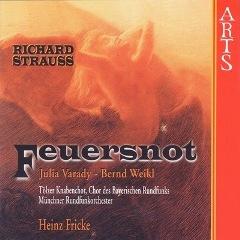Richard Strauss – Feuersnot (1984)
Richard Strauss – Feuersnot (1984)

1. Vorspiel - Gebts Uns A Holz Zum Sudenfeuer - Tolzer Knabenchor/Gerhard Schmidt-Gaden/Helmut Berger-Tuna/Julia Varady... 2. Labt Den Seltsamen Nachbarn - Manfred Schenk/Kleth Engen/Raimund Grunbach/Friedrich Lenz/Chor Der Bayerischen Rundfunks... 3. Ihr Kindlein, Ungestume - Bernd Weikl/Tolzer Knabenchor/Gerhard Schmidt-Gaden/Ruthild Engert/Kaja Borris... 4. Dab Ich Den Zauber Lerne - Bernd Weikl 5. Pfuch! Schamts Euch, Junker Ubermut! - Helmut Berger-Tuna/Manfred Schenk/Andrea Trauboth/Friedrich Lenz/Ruthild Engert/Kaja Borris... 6. Diemut, Trankst Du Den Minnetrunk? - Ruthild Engert/Kaja Borris/Elisabeth-Maria Wachutka/Julia Varady/Chor Der Bayerischen Rundfunks... 7. Pockszigel! Welch Wust' Gelarm - Hans-Dieter Bader/Helmut Berger-Tuna/Julia Varady/Tolzer Knabenchor/Gerhard Schmidt-Gaden 8. Das Magdlein Hebt Zum Greinen An - Hans-Dieter Bader/Helmut Berger-Tuna/Tolzer Knabenchor/Gerhard Schmidt-Gaden 9. Feuersnot, Minnegebot - Bernd Weikl/Hans-Dieter Bader 10. Mittsommernacht! Wehvolle Wacht! - Julia Varady/Bernd Weikl/Tolzer Knabenchor/Gerhard Schmidt-Gaden 11. Leise, Leise! Lasst Uns Schauen - Ruthild Engert/Kaja Borris/Elisabeth-Maria Wachutka/Bernd Weikl/Julia Varady/Hans-Dieter Bader... 12. Hollenspuk! Satanstrug! - Chor Der Bayerischen Rundfunks/Gordon Kember/Tolzer Knabenchor/Gerhard Schmidt-Gaden 13. Oh Weh, Herr Schweiker Von Gundelfing - Bernd Weikl 14. Habt Ihr Gehort? - Muncher RSO/Heinz Fricke 15. Zwischenspiel Und Finale - Muncher RSO/Heinz Fricke Diemut - Julia Varady Kunrad - Bernd Weikl Ortlof Sentlinger - Helmut Berger-Tuna Kunz Gilgenstock - Keith Engen Schweiker von Gundelfingen - Hans-Dieter Bade Elsbeth - Ruthild Engert(-Ely) Wigelis - Kaja Borris Margret - Elisabeth-Maria Wachutka Jörg Pöschel - Manfred Schenk Hämerlein - Raimund Grumbach Kofel - Waldemar Wild Ortlieb Tulbeck - Friedrich Lenz Ursula - Marga Schiml Ruger Aspeck - Willi Brokmeier Walpurg - Andrea Trauboth A Maiden - Carmen Anhorn Chor des Bayerischen Rundfunks - Tölzer Singerknaben Münchner Rundfunkorchester Heinz Fricke – conductor
Richard Strauss' first opera, Guntram, premiered in Munich, was a failure. And so Feuersnot ("Fire Emergency," or "Lack of Fire"), his second, was a satire of that city's people. Set in 12th-century Munich, the story begins with the town's children who are looking for wood in order to burn their summer solstice bonfires. Konrad, a stranger and apprentice to a sorcerer, allows them to use wood from his house. Konrad loves Diemut, the mayor's daughter, and he kisses her without her permission. To get back at him, she plans a trick: She lowers a basket from her balcony and invites Konrad in; half way up, she abandons him and leaves him hanging there, to the mockery of the townsfolk. In retaliation, Konrad calls upon the sorcerer to extinguish every fire in town (a town that "scorns the power of Eros"), decreeing that none shall be lit until Diemut acknowledges her love for him. With the prodding of the local burghers, she eventually does, and the fires are re-lit (fire = passion and love) and everyone is happy.
The slap in the face is to the people of Munich for rejecting both Strauss and his idol, Wagner--and indeed, Feuersnot contains many Wagnerian references. When a giant is mentioned, the "Fafner" motif is heard in the orchestra; later, during a long monolog of Konrad's, he refers to a "noble ruler" and the "Valhalla" motif shows up; bits of Flying Dutchman occasionally can be heard, and even in the text there are puns on Wagner's name. Konrad clearly is Strauss; the sorcerer he calls upon is Wagner. None of this makes the opera any more entertaining, by the way, and it's a work that despite a pretty waltz and a fine duet for our lead soprano and baritone, resolutely refuses to become either interesting or beautiful until near the end, when an orchestral interlude accompanying the relighting of the fires suddenly reminds us of the Strauss we love. The orchestra is big-Strauss-sized, but only here, near the opera's end, do we get that singularly rhapsodic feeling he imparts at his best.
Aside from a fine orchestra and chorus (including an excellent children's choir) and a conductor who can hold the 90-minute work together, the opera needs only a fine soprano and baritone to succeed, and all the ingredients are in place on this 1986 recording. Baritone Bernd Weikl has the lion's share of the solo music, and he handles the role of Konrad well. Konrad is somewhat of a philosopher and can be long-winded, but Weikl's smooth delivery and attention to the text keep our interest. The remarkable Julia Varady is Diemut, singing radiantly and changing from proud, arrogant girl to woman-in-love before our eyes (ears?). And the rest of the cast is very good under Heinz Fricke's tight leadership. The libretto is printed only in German, but the booklet contains a good synopsis and accompanying notes. This is undoubtedly for Strauss completists, but it's interesting enough in its own right. ---Robert Levine, ClassicsToday.com
download: uploaded yandex 4shared mediafire solidfiles mega zalivalka filecloudio anonfiles oboom
